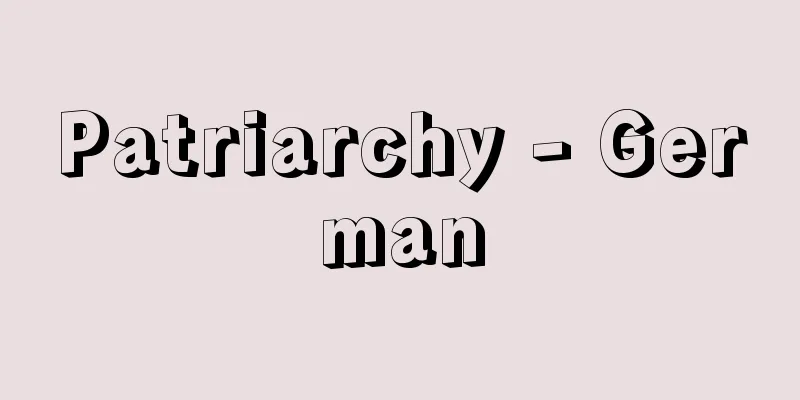Patriarchy - German

|
In ancient and medieval Western European family communities, the head of the family exercised patriarchal power to control and govern its members. The members of the family were subject to the patriarch in a strictly personal relationship of obedience. The patriarch's power was unlimited and arbitrary, and was given legitimacy through personal obedience based on the belief that customary traditional norms were inviolable. Therefore, it was exercised quite freely, unless it was restricted by other traditions or hindered by competing powers. The patriarch's power was typical of the patriarchal family of ancient Rome, where the patriarch's power treated the members of the family, whether male or female, children or slaves, as if they were property, and even had the power to decide their life and death. Children were distinguished from slaves as free persons, but the patriarch could sell his own children as slaves or even make slaves his children and heirs based on his will. Patriarchal power was thus a single authority that concentrated all control over those belonging to the family, but later it differentiated into paternal power over descendants, husband's power over wives, slave power over slaves, and ownership of property. The patriarchal family is contrasted with the modern family, and there is a theory that sees the head of the family in Japanese homes as being similar to this. The concept of patriarchy is also used as a type of social control structure, as in patrimonial control through its decentralized family power. [Takashi Nakano] [Reference] |Source: Shogakukan Encyclopedia Nipponica About Encyclopedia Nipponica Information | Legend |
|
西欧の古代や中世の家(いえ)共同体において家長が家父長(パトリアーク)としての権力を行使し、成員を統率支配する制度。その家の成員は、この家父長(かふちょう)に対し厳密に個人的な恭順関係において服従する。この家父長がもつ権力は無制限かつ恣意(しい)的で、しきたりとなっている伝統的規範が侵しがたいものだという信念に基づく個人的な服従によって正当性を与えられている。それゆえ、他の伝統によって制限されたり、または競合する他の権力によって妨げられたりしない限りは、まったく自由気ままに行使される。古代ローマの家父長制家族はその典型であり、家父長の権力は、家の成員が男であれ女であれ、子であれ奴隷であれ、財産同様に取り扱い、生殺与奪の権さえもっていた。子は自由人として奴隷とは区別されたが、家父長権は自分の子を奴隷として売ることも、遺言に基づいて奴隷を子とし同時に相続人とすることさえもできた。 家父長権は、このように家に属するものに対するいっさいの支配権を集中した単一のものであったが、のち、子孫に対する家父権、妻に対する夫権、奴隷に対する奴隷権、物に対する所有権などに分化した。家父長制家族は近代家族と対比され、日本の家における家長もこれに準ずるようにみる説がある。また家父長制の概念は、その分権化された家権力による家産制支配などと同様に、社会の支配構造の型としても用いられる。 [中野 卓] [参照項目] |出典 小学館 日本大百科全書(ニッポニカ)日本大百科全書(ニッポニカ)について 情報 | 凡例 |
<<: Capuchin Order (English: Ordo Fratrum Minorum Capuccinorum, Latin)
Recommend
Galland, Antoine
Born: 1646. Near Montdidier [Died] 1715. French or...
Confucianism
A representative ideology of China. It began with...
Funehiki [town] - Funehiki
A former town in Tamura County in the Abukuma High...
Battle of Mukden
The last large-scale land battle of the Russo-Jap...
Aoki Whitefly - Aoki Whitefly
...Many of the species native to Japan emerge thr...
Shikoku dog
A breed of domestic dog native to Japan. A medium...
Souboku
[raw]? Died: September 22, 1545. Renga poet of the...
Erythraean
...the name given to the Hamitic languages and ...
Ome Electric Railway
...JR East's commercial line, which starts at...
Horse-theater - Umashibai
A tent performance where all the performers ride h...
Main railway network - Kansen-tetsu-do-mo
...The trunk line section was determined based on...
Noto Peninsula
Located in the center of Honshu, it is the larges...
Raw monkey liver - Saru no Ikigimo
A folktale. One of the animal folktales that has ...
Asayama Irin-an
Year of death: 21 September 1664 (8 November 1664)...
Akania (English spelling) Akania hillii Hook.f.
A tree of the Acanthaceae family native to eastern...









